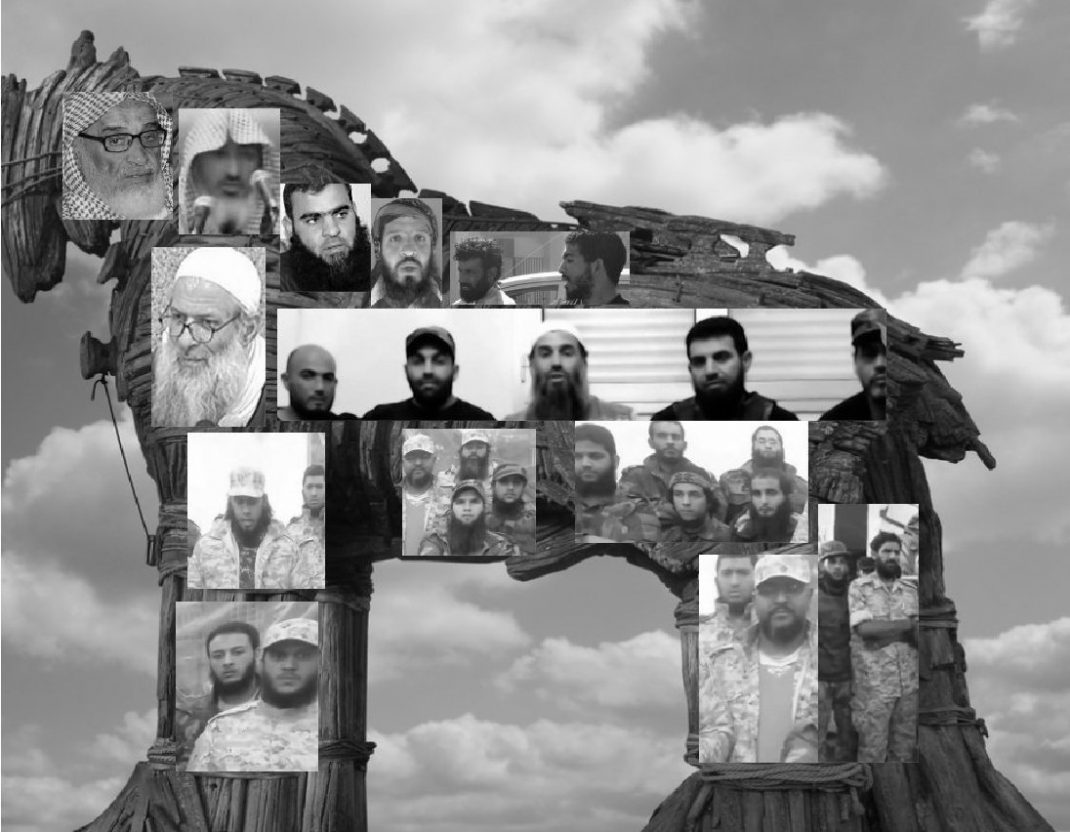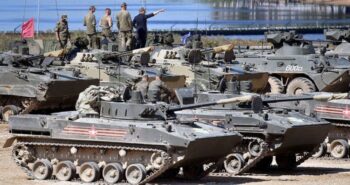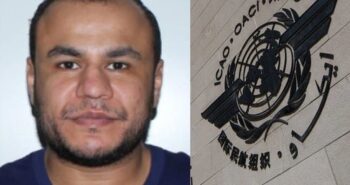By Francesca Mannocchi
A fringe Salafist group is slowly building huge influence on several fronts in Libya’s chaos, and locals are saying the rise of an ultraconservative Islamist militia looks very familiar.
***
PART TWO
During the battle for Sirte, groups of IS militants fled to southern Libya, both from Sirte and from Benghazi. Shukri says that among them was a man named Abu Mohad, an Iraqi who – in Shukri’s words – played a central role in the hierarchy of the IS organisation and would be reorganising its fighters in the south.
“They also have a training camp around Hurush, 150 kilometres south of Al Jufra,” says Shukri. “The desert is out of control and is the safest place for them at the moment.
Everyone sees everything, there are Americans in Libya these days who are monitoring the action with their drones.
In the past 11 months, the Americans have bombed IS’ Libyan posts eight times, which shows that the group is clearly still active and considered a danger by everyone, inside and outside the country.”
Lieutenant-General Robert Ashley, the head of the Defense Intelligence Agency, told the Senate Armed Services Committee in written testimony last month: “ISIS in Libya remains a formidable regional terrorist threat, Al Qaeda affiliates in Libya are spreading their influence, particularly in the ungoverned southern region.”
These concerns confirmed the latest UN report, from February 12: “ISIS has the ability to conduct complex terrorist attacks” with both “desert units” operating in southern and central Libya and with “sleeping cells” waiting in other parts of the country.”
“The extremists for me are all the same: IS, Salafis, Brotherhood, I do not care how they’re called,” says Shukri. “I’m interested in knocking them down if they put the country in danger. We know here in Misrata and Sirte, the 604th battallion is the next problem.”
The 604th infrantry battallion is a brigade created during the Sirte offensive. Its members are Madkhalists, who follow a strain of Islamist thought within the larger Salafist movement.
Madkhalism in Libya is now considered the latest threat.
It is an ultraconservative Salafi trend, founded by a Saudi sheikh, Rabi al-Madkhali, who was invited to Libya in the 1990s by Gaddafi to oppose jihadists and the Muslim Brotherhood.
The Madkhalists have an unshakable faith in established authority while despising democracy and Western traditions. Their rejection of elections is one reason they are so popular with dictators, and one of the reasons why Gaddafi chose the Madkhalist tribes as allies against the Muslim Brotherhood.
The Madkhalists were loyal to him even during the revolution.
Madkhalism was so widespread under Gaddafi that one of his sons, Saadi, joined the group.
Local sources say Saadi Gaddafi became a Salafist student of Madkhalism and he held several meetings in Tripoli with Madkhal sheikhs who claimed to be jurisprudent experts.
Saadi had strong links with Saudi sheikhs, and at the beginning of the 17 February revolution, Madkhal sheikhs from Saudi Arabia sent a fatwa saying revolution against Gaddafi was “sedition” – telling people to stay home and not take to the streets.
In the months after the revolution, Madkhalists in Libya destroyed historic mosques, shrines and Sufi libraries. They are also suspected of being responsible for the recent assaults on Sufi mosques in the country.
Today the Madkhalists – who currently control more mosques than any other group in Libya – are increasingly widespread in the country.
Their growth makes the balancing act of those committed to national reconciliation all the more difficult.
In the west, the most powerful Madkhalist militia is Rada, run by Abdourfauf Kara. It controls the Mitiga airport and most of the city, as well as the personal security of Fayez al-Sarraj, the prime minister of the UN-backed “Government of National Accord” which sits in Tripoli.
Just a few months ago, Rada militiamen broke into a comic book fair in Tripoli and arrested participants and organisers alike, accusing them of “weakening the religion and being fascinated by foreign traditions”.
In the east, the Madkhalists support General Haftar, whose sons Khaled and Saddam, according to local sources, head two Salafi brigades controlling Benghazi with public punishment and arbitrary executions.
When Haftar launched his “Operation Dignity” in eastern Libya, Sheikh Rabi al-Madkhali issued a fatwa on the need for Salafis to support Haftar against the Muslim Brotherhood.
“It was in this context that Haftar dissolved the Salafi brigade of Madkhali known as the Tawhid Brigade and incorporated it into its army, dividing men into various brigades and major military divisions such as the 210th Infantry Regiment and the Sa’iqa Special Forces 302,” says Ahmed Sala Ali of the Atlantic Council.
In Misrata and in Sirte, the Madkhalists formed the 604th Brigade, originally to free Sirte from IS – but which has become increasingly threatening and powerful over the past few months.
Many members of the brigade belong to the Farjani tribe, the tribe of Khalifa Haftar. The rogue general claims their support while appearing outside Libya as the one person in Libya defending secularism against Islamic extremism.
“What is happening now,” says one local source who asked to remain anonymous for security reasons, “is that the Madkhalists in the east and west are plotting and tightening alliances under the table. Haftar knows it well and more and more often his men come to visit Misrata or are hosted in Tripoli.
“There are Madkhalists linked to Haftar who visit the other Madkhalist groups both in Misrata and Tripoli every week. Our feeling is they are creating the conditions to facilitate the arrival of Haftar in the west, like they did during the war in Sabratha in September.
Tripoli’s militias are crucial for these groups, because it is in Tripoli that arrives the money of the Madkhalists.”
According to the source, the group receives large deliveries of cash from Saudi Arabia. Sheikh Rabi al-Madkhali also sends audio messages and fatwas to his affiliates through Abu Obeida, a Libyan sheikh who was his Sharia student in Medina, where Madkhali is now based.
“We know that money boxes arrive from Riyadh airport, Rada forces control the airport and arbitrarily decide who and what enters or exits the country,” says our source.
Talk with the Madkhalists is impossibile, they are powerful, militarily well trained, they have their Quran schools in Tripoli and they are more and more numerous.
The brother of the former mayor of Misrata is Madkhalist, and even there, in Misrata, they want to influence decisions of the municipal council. They want to enter the institutions and dominate them. It is their strategy now.
The source, who fought during the battle for Sirte, recalls that even then it was clear that the Madkhalists would become a problem for the stability of Libya.
“They had their own field hospitals, once they burned the Libyan flag. They did not fight for our country, they fought their own religious war, Salafis against other Salafis.”
The imam of the Sirte mosque was a member of the Farjani tribe, and so the mosque became a key goal for the 604th battalion. Many Farjani tribesmen had been killed by IS there in the mosque in 2015.
“They were well trained,” the source says. “We all knew we needed them in the battle of Sirte, but at the same time we knew their organisation would become a threat. And now we are seeing what we had foreseen.”
The Madkhalists are today moving on three separate fronts, without waging war, rather showing a solid loyalty to the doctrines that they are religiously required to follow.
If, hypothetically speaking, these three groups united into a common front, they would form a powerful capillary ultraconservative bloc, with a single goal – that is to establish a de facto theocracy, influencing Libyan politics without formally taking part in it.
“And this,” says our local source, “would be exactly the purpose of their recent meetings.”
Ismail Shukri didn’t totally reject such a possibility. “In Misrata, the 604th formally depends on the local militias, but something is certainly moving in the shadows.”
In Sirte, citizens such as Khaled think that Madkhalists act much like the Islamic State group.
“There is not so much difference, now they move like the jihadists at the very beginning: they treat our children very well, and they provide security and services. But it is clear that they have a long-term project.
“It is clear to us, I wonder if it is also for Westerners, who, through Sarraj and Haftar, are supporting and giving credibility to these extremist groups.”
The question in the near future will therefore be to understand the long-term targets of the Salafis in Libya – and of the Gulf states that support them – and what the consequences may be of a growing presence of the Madkhali Salafis in Haftar’s ranks.
There is a tendency in Western analysis to over-simplify the situation – seeing only secularists facing fundamentalists in Libya – and the risk of reproducing a scheme already seen in the past, when Ansar al-Sharia’s affiliates built their consent through police services, city control and growth of their religious institutions, gaining the support of a large part of the population.
The alliance between Haftar and the Salafi Madkhalists could be extremely useful for both. The Madkhalists aim to have a strong presence in public life, controlling an ever-increasing number of mosques and bringing unemployed youth and other vulnerable segments of society into its tent of support. Meanwhile, Haftar needs popular support and also to increase his troops.
By combining these two elements – popular support and military strength – Haftar may appear, as Libya lurches towards eventual elections, as the only solution to the country’s many problems.
The risk is that, in hope of finding stability, foreign governments will blindly support ultraconservative groups – directly or indirectly – which will undoubtedly create more problems in the future.
Now both Sarraj and Haftar are using the Salafis against their rivals but this co-opting of the Madkhalists – financed and sustained ideologically by the Saudis – risks destabilising the whole of north Africa and radicalising a new generation of young people frustrated and unemployed.
***
Francesca Mannocchi is an Italian journalist who previously reported from the front lines of the battle for Mosul and on the refugee crisis in Libya. She writes and broadcasts for a number of regional and international publications.
_____________




